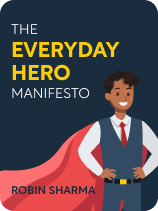

This article is an excerpt from the Shortform book guide to "The Everyday Hero Manifesto" by Robin Sharma. Shortform has the world's best summaries and analyses of books you should be reading.
Like this article? Sign up for a free trial here.
What is mental energy? How does empowering your mind keep you energized?
Just like you need to eat a healthy, well-balanced diet in order to have a strong body, The Everyday Hero Manifesto by Robin Sharma says that you need to “feed” your mind with educational and empowering ideas in order to strengthen it. At the same time, you need to be aware of how much mental energy you’re using.
Keep reading to learn how to use your mental energy wisely.
Empower Your Mind
Think about the people you spend the most time with, the TV shows you watch, and so on—anything that you regularly feed your mind. Make sure you’re getting helpful and inspirational messages from them; get rid of anyone and anything that frequently gives you degrading, hurtful, or hateful ideas that drain your mental energy.
(Shortform note: Strengthening your brain by “feeding” it positive messages isn’t just a metaphor—in Behave, neurologist Robert Sapolsky says that your brain physically changes in response to certain stimuli, a phenomenon called neuroplasticity. Much like your muscles, your brain gets better at things it does frequently. Therefore, by focusing on positive ideas like compassion or self-esteem, you’ll find that those ideas start coming to you more easily over time. In other words, thanks to neuroplasticity, you can intentionally change your personality and become the kind of person you want to be.)
Spend Your Mental Energy Wisely
Unfortunately, no matter how much you strengthen your mind, you’ll always have a limited amount of mental energy you can use each day. Therefore, it’s crucial to use your mental energy wisely.
(Shortform note: Overusing your mental energy can cause burnout, a severe form of exhaustion that can impact every part of your life. Burnout occurs when high levels of stress over a long period of time cause you to become unmotivated, depressed, and irritable. You might find yourself skipping work or school much more often than usual, and you can even become more prone to getting sick.)
Sharma says that you’ll be at your best during the first 90 minutes of your workday, before you start getting fatigued. Therefore, you should tackle your most important tasks right away. Planning ahead is key for this: Figure out what absolutely needs to get done so you know what to do first each day.
Also, schedule plenty of time to rest and recover, especially if your job requires a lot of brainpower—you can’t do your best heroic work if you’re tired. Importantly, Sharma says that recovery methods vary from person to person and situation to situation. For example, one person might find that going on a nature walk in the afternoon is the best way to rest and recover, while another might have better results watching their favorite TV show in the evening.
(Shortform note: What if you’re not sure which activities best help you to rest and recharge? Some simple ways to mentally recharge include exercising, meditating, spending time in nature, and spending time with animals. Give these a try and see if they work for you—if they don’t, keep trying different restful activities until you find one that suits you.)
| Use Your Energy Wisely By Prioritizing Your Tasks and Goals In First Things First, Stephen Covey gives further advice for planning ahead and managing your time; his advice may help you implement Sharma’s recommendations for spending your mental energy wisely. First, Covey suggests writing down everything you know you need to do—whether short-term or long-term—and dividing those tasks into categories based on their importance and their urgency. Things that are both important and urgent, like a time-sensitive report, are things that you should do right away; perhaps during the first 90 minutes of your work day, as Sharma suggests. For things that are important but not urgent, like big goals, schedule time to do them later on. By following this prioritization method, you’ll handle most of your important tasks before they become urgent, meaning that you won’t be in a constant state of emergency, racing to complete tasks. As a result, you’ll have more time to work slowly and steadily on tasks that are important but not urgent, such as your long-term goals. Also, if an emergency does arise, you’ll have the time to deal with it. Covey adds that you might be tempted to put rest and recreation in the “not urgent, not important” category because it doesn’t feel productive. However, taking care of yourself is an important task that you should handle before it becomes urgent—in other words, you should take the time to rest before you burn yourself out. |

———End of Preview———
Like what you just read? Read the rest of the world's best book summary and analysis of Robin Sharma's "The Everyday Hero Manifesto" at Shortform.
Here's what you'll find in our full The Everyday Hero Manifesto summary:
- Why you don't need superpowers in order to achieve great things
- How to unlock your heroic potential and become a force for good
- Why helping others is the best way to enrich your own life






